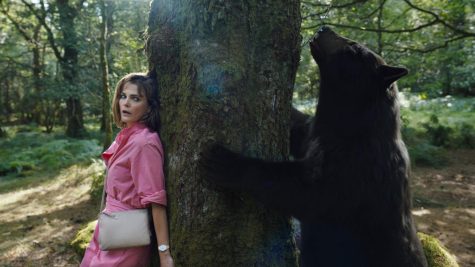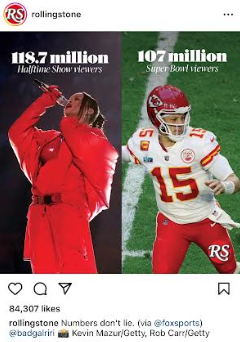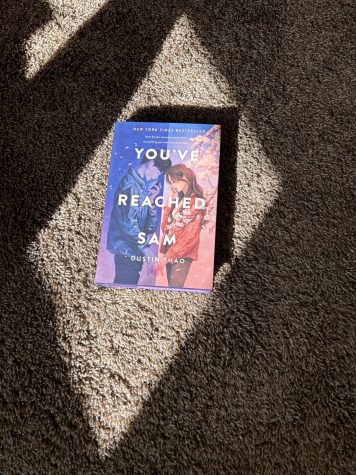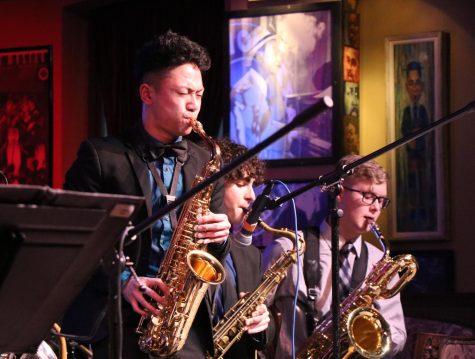Swift releases re-recordings of her iconic discography
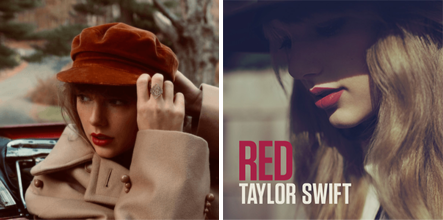
Photo courtesy of wikipedia.org
Each of the re-recorded albums feature brand new album covers, which reflect Taylor Swift’s evolution in art style and pay homage to their original counterparts. A main difference between Swift’s version (left) and the original (right) cover art is the exclusion of her name and a prominent album title. In her newer albums– “Lover,” “Folklore” and “Evermore”– Swift’s name doesn’t appear on the cover art, a pattern she continued into her re-recorded covers.
December 3, 2021
On Nov. 12, Taylor Swift released her newest body of work, “Red (Taylor’s Version)”– a re-recording of her trail-blazing 2012 album that solidified her presence in the pop world. Her second of six albums that are set to be re-recorded, the album has made a huge impression, as it became the most-streamed album by a female on Spotify in a day. Her re-recordings have been a trending topic on social media, garnering much anticipation from fans, and they have good reason to get excited given the history with her former record label Big Machine Records founded by Scott Borschetta in 2005.
Swift was the first artist signed under BMR with a 13-year contract. Swift recorded her first six albums there, resulting in BMR owning those masters– the original recording of a song used to make more copies.
After the 13-year contract expired, Swift left BMR to sign with Republic Records and Universal Music Group in November 2018. Here she would be able to own her masters, starting with her seventh album, “Lover,” which was released in August 2019.
In a June 2019 Tumblr post, Swift said, “For years I asked, pleaded for a chance to own my work. Instead I was given an opportunity to sign back up to Big Machine Records and ‘earn’ one album back at a time, one for every new one I turned in. I walked away because I knew once I signed that contract, Scott Borchetta would sell the label, thereby selling me and my future. I had to make the excruciating choice to leave behind my past.”
Borchetta then posted a response to the claims on the Big Machine Label Group website on June 30, 2019: “Out of courtesy, I personally texted Taylor at 9:06pm, Saturday, June 29th to inform her prior to the story breaking on the morning of Sunday, June 30th so she could hear it directly from me,” he wrote. “I guess it might somehow be possible that her dad Scott, 13 Management lawyer Jay Schaudies (who represented Scott Swift on the shareholder calls) or 13 Management executive and Big Machine LLC shareholder Frank Bell (who was on the shareholder calls) didn’t say anything to Taylor over the prior 5 days. But, I truly doubt that she ‘woke up to the news when everyone else did.’”
Swift’s team denied those claims, telling People magazine that “Scott Swift is not on the board of directors and has never been. On June 25, there was a shareholder phone call that Scott Swift did not participate in due to a very strict NDA [Non-disclosure agreement] that bound all shareholders and prohibited any discussion at all without risk of severe penalty. Her dad did not join that call because he did not want to be required to withhold any information from his own daughter. Taylor found out from the news articles when she woke up before seeing any text from Scott Borchetta, and he did not call her in advance.”
While Swift was content with the fact that Borchetta would inevitably sell her masters, she felt backstabbed after a $300 million deal in which Scooter Braun, record executive and celebrity manager, acquired her masters.
“He knew what he was doing; they both did. Controlling a woman who didn’t want to be associated with them. In perpetuity. That means forever,” Swift continued in her Tumblr post. “I learned about Scooter Braun’s purchase of my masters as it was announced to the world. All I could think about was the incessant, manipulative bullying I’ve received at his hands for years.”
Swift retained the publishing rights to her first six albums due to her role as the main songwriter of the songs she released under BMR, which would allow her to re-record the songs in the future if she wanted to, as per the artist-label agreement that outlines the artist cannot re-record a song for a fixed amount of time.
In the same month she released “Lover,” Swift announced plans to re-record her first six albums so the new album’s money earned wouldn’t go to her old label. By re-recording, Swift is technically covering her own songs into new sound recordings, resulting in new masters that she fully owns, which would enable her to control the licensing of her songs for commercial use, bypassing the owners of the older masters and subsequently devaluing them.
Aside from monetary purposes, she wanted to take back artistic liberty and add songs that were held back in the creative process the first time. For example, Swift wanted “Red” to be a pop album, but BMR wanted it to remain relatively country to stay on brand with the singer’s career. Now that Swift owns all the songs herself, she can re-release these albums with any alterations she wishes.
“Artists should own their own work for so many reasons, but the most screamingly obvious one is that the artist is the only one who really *knows* that body of work,” Taylor Swift said in a Feb. 11 post on her Instagram account. “For example, only I know which songs I wrote that almost made the ‘Fearless’ album. Songs I absolutely adored, but were held back for different reasons (don’t want too many breakup songs, don’t want too many down tempo songs, can’t fit that many songs on a physical CD). Those reasons seem unnecessary now. I’ve decided I want you to have the whole story, see the entire vivid picture, and let you into the entire dreamscape that is my ‘Fearless’ album.”
“Fearless (Taylor’s Version)” is the first album she re-recorded, featuring all the songs on the original album, as well as six “From The Vault” songs which were cut from the initial release of “Fearless.” The freshly recorded tracks had slight changes vocally that the keen listener may catch, and when listened to side-by-side with the original, listeners can hear Swift’s progression vocally since 2008 when “Fearless” was released.
“A few differences I’ve noticed between ‘Fearless’ and ‘Fearless (Taylor’s Version)’ from the times I’ve listened is her voice sounds way more mature, and there are changes in the way she sings a few lines, like she’s emphasizing them,” Alma Jimenez, sophomore, said. “There is a 13-year difference between the two albums, and these slight changes aren’t too evident, but her improvement in vocal experience and small tweaks in some vocals definitely stood out to me.”
Swift is known to stir up excitement for her new releases, including the re-recordings, by dropping “easter eggs” and hidden messages through her social media. Everything from the color of her nails, the number of emojis in her tweets and her Instagram captions have been used as hints, which has led her community of fans to keep a keen eye on anything she posts or says that may be hinting at the order in which the re-recordings will be released and when.
In the time ahead of her release of “Fearless (Taylor’s Version),” Swift posted a video to her Instagram account that featured scrambled letters flying out of a vault door– it didn’t take long for fans to unscramble the words and figure out the titles of each of the six “From The Vault” tracks.
Anticipation for “Red (Taylor’s Version)” has been underpinned by a short film titled “All Too Well (The Short Film)” and appearances on Jimmy Fallon’s and Seth Meyers’ late night talk shows on Nov. 11. Swift has also partnered with Starbucks to create “Taylor’s Drink,” a caramel latte, and to have her music play at Starbucks location in the time surrounding the release of “Red (Taylor’s Version).”
The album released on Nov. 12, featuring all of “Red’s” original tracks plus nine “From The Vault” tracks, including a 10-minute-long version of one of Swift’s most beloved songs “All Too Well” and collaborations with Phoebe Bridgers, Ed Sheeran and Chris Stapleton. A music video for “I Bet You Think About Me” featuring Stapleton was released on Nov. 15, and “Nothing New” with Phoebe Bridgers became a popular track from the vault for its emotional lyrics and intimate storyline. Some highlights from the original album include refreshed fan favorites “State of Grace,” “Treacherous” and ‘Come Back… Be Here.”
“Taylor’s re-recordings are so exciting to all fans because it reminds [them] of some of [their] favorite childhood songs, except now they are all fresh and new. It brings a lot of comfort to old fans and gives new fans more chances to get into her music,” Nadia Emso, junior, said.
Aside from the release of brand new unreleased songs and the nostalgia brought on by the re-recorded favorites, fans are also eager to continue to support Swift in her endeavor to take back the rights to her work.
“I think her fans are looking forward to the re-recordings because it’s very exciting to see how much she has grown as an artist,” Jimenez said. “Also, I think the most important thing that will be coming from these re-recordings is Taylor’s ownership of all the songs. When her version is played, she will be the one to receive profit, and I believe many are proud that she will be receiving the credit she deserves.”
